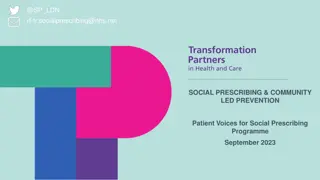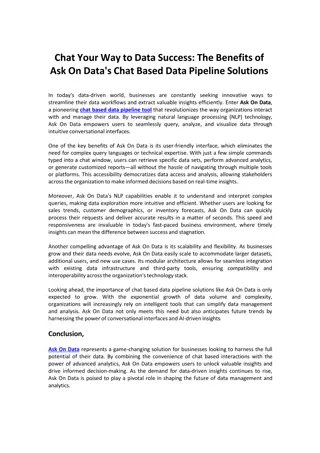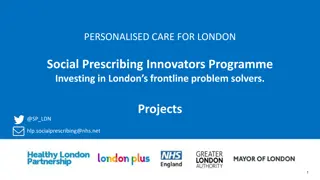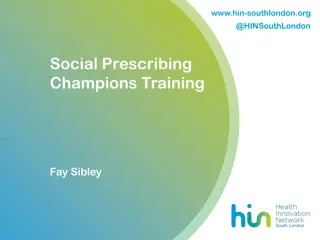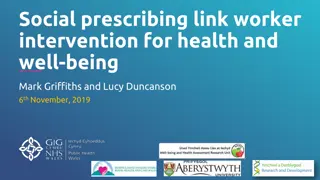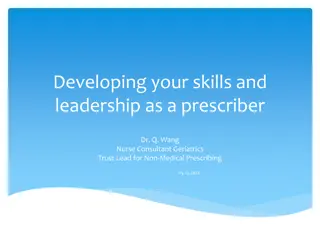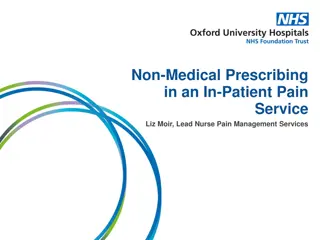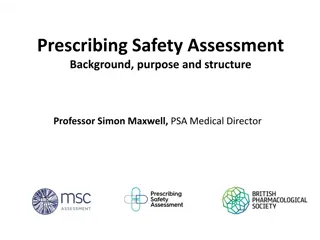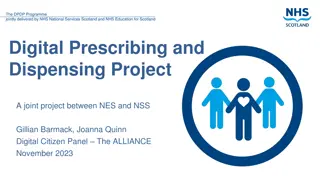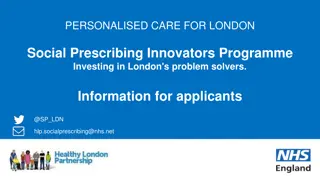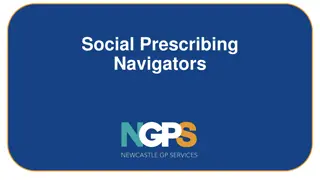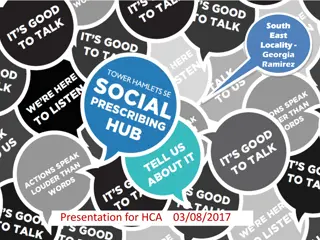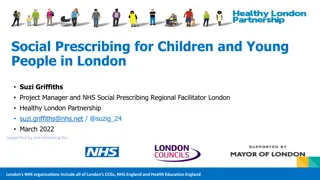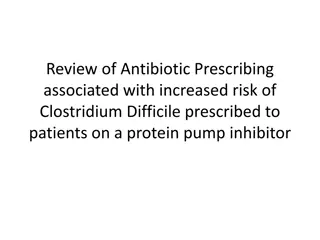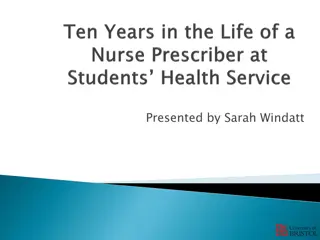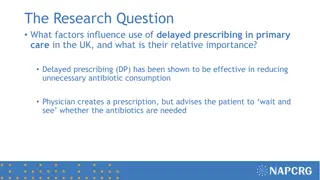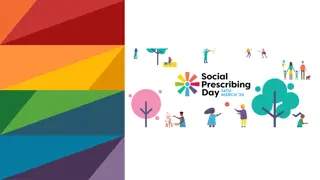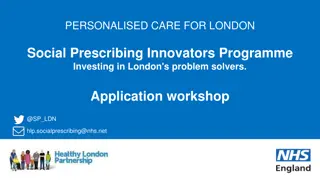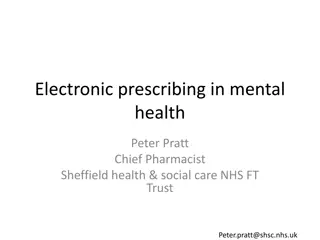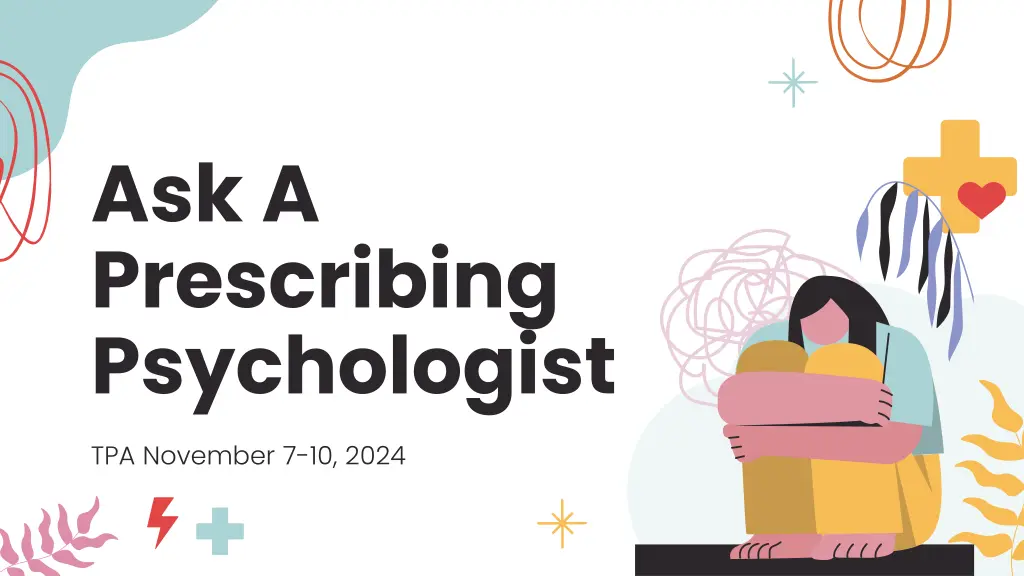
Practical Insights from Ask a Prescribing Psychologist TPA Event
Gain valuable insights on psychotropic medications, referrals, and client communication from the Ask a Prescribing Psychologist event. Learn about medication management, new treatments, and cannabis effects in mental health. Discover when to refer for medication, how to provide warm hand-offs, and teach clients to communicate with their prescribers effectively.
Uploaded on | 0 Views
Download Presentation

Please find below an Image/Link to download the presentation.
The content on the website is provided AS IS for your information and personal use only. It may not be sold, licensed, or shared on other websites without obtaining consent from the author. If you encounter any issues during the download, it is possible that the publisher has removed the file from their server.
You are allowed to download the files provided on this website for personal or commercial use, subject to the condition that they are used lawfully. All files are the property of their respective owners.
The content on the website is provided AS IS for your information and personal use only. It may not be sold, licensed, or shared on other websites without obtaining consent from the author.
E N D
Presentation Transcript
Ask A Prescribing Psychologist TPA November 7-10, 2024
Introductions Cheryl Hall PHD, MSCP Caroline Williams PHD, MSCP Melody Moore PHD, MSCP Private Practice DOD contractor Private Practice Texas Texas Texas New Mexico New Mexico New Mexico
Disclosures This presentation may discuss off label uses of medications. No commercial support was received for this activity. Dr. Williams is employed as an independent contractor to the Defense Health Agency, part of the Department of Defense. The views expressed in this presentation are her personal views, and do not necessarily reflect the official policy or position of the Department of Defense or the US Government.
Learning Objectives Name a side effect from a psychotropic medication, and a method for managing it 01 Identify two new pieces of information about psychotropic medications that you can share with your clients to help them benefit more and from their existing medications 02 Name a new psychotropic medication treatment and the treatments target population/diagnostic category 03 Discuss two effects of cannabis in mental health treatment 04
When Is It Time to Refer for Medication Symptoms are severe or chronic Patient has not responded to therapy Patient has a history of success with medication Patient has psychotic symptoms Patient has a mental health condition Patient has substance use disorder
How To Refer Warm Hand-off Letter to Prescriber Explaining Symptoms and Diagnosis Provide Feedback if Medication is Started
Teach Your Client to Talk to Their Prescriber Side Effects Help client keep track of unusual side effects Note Affect Watch for improved or worsening affect (Brightened vs Blunted) Track moods Use an App or 5 point rating scale to track moods Family Feedback Encourage client to solicit feedback from sig others
Not so recent, but may be new to you Escitalopram (Lexapro): FDA approval for GAD in children 7 years and up (2023). Already approved for children 12 and up and adults with MDD
March 2024 Transcranial Magnetic Stimulation: First line add-on for adolescents with Depression. FDA approved for 15-21 year olds with MDD Produced by NeuroStar
March, 2024 Credit to Pujol, Lynette (March 2024) Psychopharm Leadership Summit.
April 1, 2024 REJOYN: First prescription digital therapeutic approved by FDA for MDD as an adjunct treatment. For patients 22 and up on an anti-depressant. Combines 6 weeks of CBT and Emotional Faces Memory Test, Personal reminders and messages. Targets neurological networks affected by depression and potentiates the brain s neuroplasticity to alter emotional connections and decrease symptoms over time.
April 3, 2024 ILOPERIDONE: Fanapt Expanded use beyond Schizophrenia Now approved for acute treatment of mixed or manic episodes associated with bipolar I in adults Side effects: tachycardia, dizziness, dry mouth, nasal congestion, weight gain, somnolence ***Very low level of motor SE ***Low likelihood of dyslipidemia ***moderate weight gain compared to others
June 2024 PITOLISANT (WAKIX): FDA approved for Excessive Daytime Sleepiness (EDS) for pediatric patients 6 years and older with narcolepsy. Side effects most common headache and insomnia. Increases the availability and synthesis of anti-histamine in the brain.
May, 2024 ONYDA XR: Clonidine hydrochloride Liquid formulation given for ADHD Non-stimulant for children 6 years and older Adverse SE: somnolence, fatigue, irritability, insomnia, nightmares, constipation, dry mouth
July 2024 Donanemab-azbt Brand Name: Kisula For Alzheimer s disease: IV infusion Less decreases in hippocampus and whole brain volume; greater increase in ventricular volume Measured by:Integrated Alzheimer s Disease Rating Scale
September 26, 2024 Cobenfy (xanameline-trospium) FDA approved for schizophrenia in adults. Muscarinic agonist (M1 and M4) and does not directly block DA receptors. Early studies are positive and it is predicted to be a first-line treatment (other than Clozapine) for schizophrenia for positive & negative symptoms and cognitive effects.
How to Increase Adherence THE most important thing you can do is ASK QUESTIONS. 1. 2. 3. 4. Any problems remembering to take your medication Do you ever accidentally skip a day or more? How many? Do you have any trouble paying for your medication? Are you having any side effects that make it hard for you to want to continue your medication? Ask directly about sexual side effects if that is a potential SE with the medication they are taking Do you delay calling in/picking up your medication and miss doses? Do you have transportation problems to go get your medication? Identifying beliefs that undermine adherence. Others you can think of? 5. 6. 7. 8.
FDA Pregnancy Categories Category A Controlled studies of women show no evidence of risk Category D Evidence of human fetal risk, but the benefits from use may be acceptable despite the risk, for ex: life threatening situation or a serious disease for which safer drugs cannot be used or are ineffective Category C Studies in animals have shown evidence of teratogenicity, but no studies have been done in women to confirm teratogenicity. Drugs should be given only if benefits justify potential risk to fetus Category B No controlled studies have been carried out Category X Studies in animals or humans have demonstrated fetal abnormalities or there is evidence of fetal risk based on human experience or both, and the risk of use of the drug in pregnant women clearly outweighs any benefit. The drug is contraindicated in women who are or may become pregnant.
Pregnancy subsection will provide information about the use of the drug in pregnant women. The Lactation subsection will provide information about using the drug while breastfeeding. The Females and Males of Reproductive Potential subsection will include information about pregnancy testing, contraception and about infertility as it relates to the drug. 2015 New Rules Pregnancy & Lactation Labeling Rule
MGH Treatment Guidelines During Pregnancy
Depressive disorder clinical case 01 Venus Venus is the second planet from the Sun 02 Saturn Saturn is a gas giant and has several rings 03 Mars Despite being red, Mars is a cold place
Depressive disorder clinical case 1 Jupiter It s the biggest planet in the Solar System Venus Venus is the second planet from the Sun 2 Saturn is a gas giant and has several rings Saturn 3 4 Mars Despite being red, Mars is a cold place
Depressive disorder clinical case Jupiter Saturn Saturn is a gas giant and has several rings It s the biggest planet in the Solar System Venus Mars Despite being red, Mars is a cold place Venus is the second planet from the Sun
Depressive disorder clinical case Time Mon. Tue. Wed. Thu. Fri. Sat. Sun. 9:00 Yoga Therapy 10:00 11:00 Yoga Therapy Yoga 12:00 Exercise Exercise 13:00 14:00 Exercise
Depressive disorder clinical case Mon Tue Wed Thu Fri Sat Sun 01 02 03 04 05 06 07 08 09 10 11 12 13 14 15 16 17 18 19 20 21 22 23 24 25 26 27 28 29 30 31 Yoga Therapy Reflection
Depressive disorder clinical case Mon Tue Wed Thu Fri Sat Sun 01 02 03 04 05 06 07 08 09 10 11 12 13 14 15 16 17 18 19 20 21 22 23 24 25 26 27 28 29 30 31 Yoga Therapy Reflection
Depressive disorder clinical case Venus Venus is the second planet from the Sun Saturn Saturn is a gas giant and has several rings 30% 40% 70% Mars Despite being red, Mars is a cold place Jupiter is big Mars is cold Venus is hot
Depressive disorder clinical case 50% Type 1 Jupiter is the biggest planet in the Solar System 70% Type 2 Saturn is a gas giant and has several rings 20% Type 3 Venus is the second planet from the Sun

